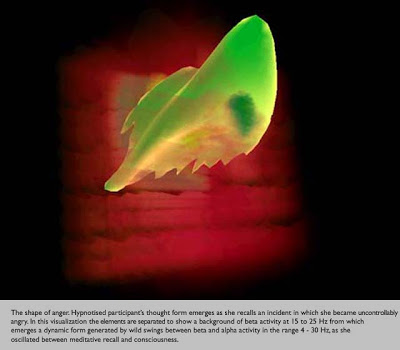Neuroscience
An interesting sci-art collaboration between University of Calgary researchers and artists Alan Dunning and Paul Woodrow, attempting to visualize thought in 3D space. They completed a number of projects under the umbrella of the Einstein's Brain Project; this one titled The Shapes of Thought.

Other images on the site include that of a man repeatedly asked to recall an incident in which he was severely injured, including a period of agitation, and couple of animations.
See more.
- How Thinking About The Future Can Cause Us To Forget The Past
We routinely envision future events, whether that be fantasising about next month’s beach retreat, or planning whether to hit the gym this afternoon before or after picking up the dry cleaning. New research supports the idea that we are able to conjure...
- Negative False Memories Are More Easily Implanted In Children's Minds Than Neutral Ones
Children develop false memories for a negative event more readily than they do for a neutral one. Henry Otgaar and colleagues, who made the new finding, said their work has real world implications for anyone working with child witnesses: "The argument...
- Manual Training For A Mind-bending Task
Rotating objects in our mind's eye is a bit like doing it in the real world. For example, when asked to judge if one shape is a rotated version of another, the time it takes us to answer correlates with the angular discrepancy between the two shapes....
- Hey Hey Kids!
Vaughan from Mind Hacks has compiled a very useful list of essential websites for mind and brain students. Whether you're a future graduate psychologist, a hardened lab-based neuroscientist or are in the midst of studying any of the cognitive sciences,...
- Sensecam
Microsoft's research project: SenseCam SenseCam and memory functioning Here is a recently published research study: SenseCam improves memory for recent events and quality of life in a patient with memory retrieval difficulties. Memory. 2011 Sep 26;...
Neuroscience
The Shapes of Thought
An interesting sci-art collaboration between University of Calgary researchers and artists Alan Dunning and Paul Woodrow, attempting to visualize thought in 3D space. They completed a number of projects under the umbrella of the Einstein's Brain Project; this one titled The Shapes of Thought.
The project asked participants to recall traumatic events from their past. They were asked to emote anger, and other primary emotions. Each participant was wired to EEG and EKG sensors and monitored [for as long as 8-14 hours]. The resulting information was visualized as still images using Iris Explorer and visualized in realtime, interactive space using specially developed data acquisition modules.

Other images on the site include that of a man repeatedly asked to recall an incident in which he was severely injured, including a period of agitation, and couple of animations.
See more.
- How Thinking About The Future Can Cause Us To Forget The Past
We routinely envision future events, whether that be fantasising about next month’s beach retreat, or planning whether to hit the gym this afternoon before or after picking up the dry cleaning. New research supports the idea that we are able to conjure...
- Negative False Memories Are More Easily Implanted In Children's Minds Than Neutral Ones
Children develop false memories for a negative event more readily than they do for a neutral one. Henry Otgaar and colleagues, who made the new finding, said their work has real world implications for anyone working with child witnesses: "The argument...
- Manual Training For A Mind-bending Task
Rotating objects in our mind's eye is a bit like doing it in the real world. For example, when asked to judge if one shape is a rotated version of another, the time it takes us to answer correlates with the angular discrepancy between the two shapes....
- Hey Hey Kids!
Vaughan from Mind Hacks has compiled a very useful list of essential websites for mind and brain students. Whether you're a future graduate psychologist, a hardened lab-based neuroscientist or are in the midst of studying any of the cognitive sciences,...
- Sensecam
Microsoft's research project: SenseCam SenseCam and memory functioning Here is a recently published research study: SenseCam improves memory for recent events and quality of life in a patient with memory retrieval difficulties. Memory. 2011 Sep 26;...
